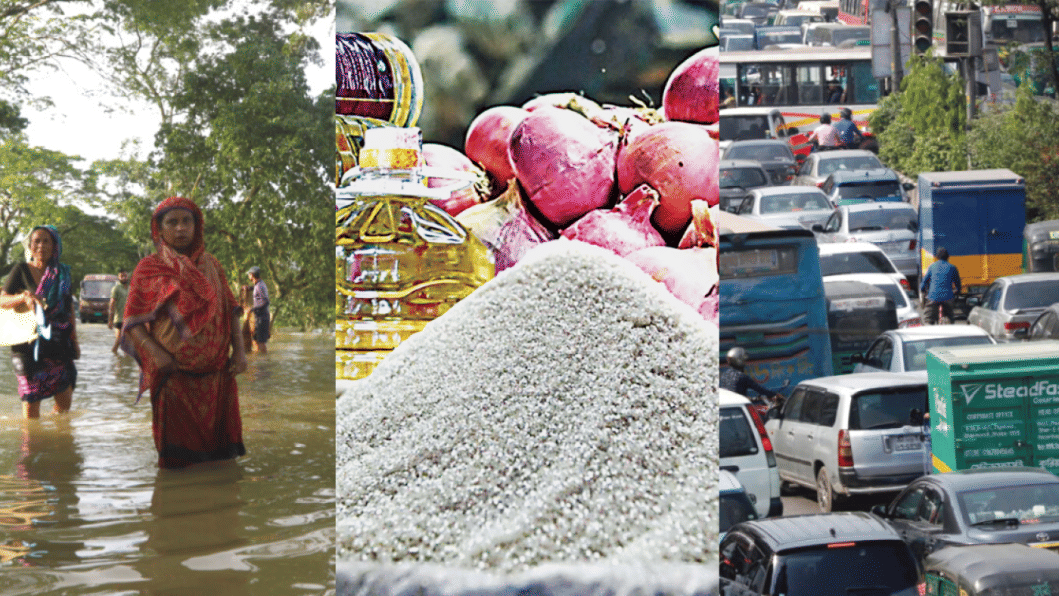Systems thinking: A solution to our many global crises

We are living in extraordinary times. Inflation, rising income inequality, mass species extinction, war in Ukraine, and the climate crisis compete (or should) for attention on the international agenda. Bangladesh also lives under a thick cloud of pollution and the daily tragedy of road deaths.
And what is our response? For each problem, there is an array of suggested solutions, but most tend to be extremely limited and focused. After all, many people are specialists who have developed expertise in a particular issue. Unfortunately, that means that they tend to think in silos. Expertise is vital – we probably can't, and shouldn't, all be generalists. But if people are too trapped in their silos, they fail to see how different problems connect.
When we think in silos, we develop individual solutions for each of these problems. Since we are so dependent on fuel, the price of virtually everything goes up when the price of fuel rises, so we demand greater subsidies for fuel.
Air pollution kills us, so we demand technological or other solutions to magically clean up our air while watching the problem continue to worsen. We make rules about seatbelts and motorcycle use and continue to mourn those dying on our roads.
As for the climate crisis, we talk about the need to move away from fossil fuels while also wondering how to adapt to a world of ever-worsening droughts, floods, and violent storms.
As I have suggested before on these pages, we would do better if we took a fresh look at these issues. We need to adopt 21st century thinking, rather than continue to believe that the responses that helped us in the previous century will continue to serve us today.
Rather than subsidise fuel – and thus continue to contribute to the climate crisis – we should consider how localisation can help solve our problems. Localisation would reduce the need to travel and to ship freight across the globe; instead, we would mostly rely on local production for needed goods. Rather than demand cheap fuel, we should demand affordable transportation. We could do all of that while increasing road safety – or rather safe travels – by shifting our focus from a motorised lifestyle to a simpler one. We could gain access through proximity rather than through constant travel. Each of those approaches would help solve our other problems rather than attempting to reduce one problem while actually worsening others.
In the US, the recent rising prices for petrol led to a surge in demand for bicycles. Sustained higher fuel prices would provide the necessary incentive to wean ourselves off of fossil fuels, something we need to do in any case. By demanding lower prices, we make ourselves susceptible to future price gouging – and failing to address the other problems caused by our addiction to cheap fuel.
The crises we face are terrifying. And yet I can still imagine an infinitely better life that would solve many of our problems – reduce our dependence on fuel, clean up our air, bring down the prices of essential goods, help prevent mass extinctions, reduce income inequality, and reduce the climate crisis – while actually contributing to, rather than destroying, our chance at happiness. We don't even need magical new technologies that haven't yet been invented or expensive consultants to guide us. Our ancestors, or indeed indigenous people, possessed the tools of living far more compatibly with nature. That knowledge is rapidly disappearing, but we can still access it. We can learn the joys of simplicity.
Consider load-shedding. Either we curse and sweat, or we rely on diesel-powered generators that are expensive, pollute, and undermine the whole purpose of load-shedding in the first place. But we could make entire cities much cooler if we used better design: More dirt and canals and trees and parks in the city, and more rooftop gardens. Those changes would also help mitigate flooding. If our cities were cooler, it would be easier to move about – at least for short trips – on foot, bicycles, and rickshaws. In a 15-minute, or better yet, five-minute, city, most of what we need would be close by. Thus, we would have far less need for cars and fuel, and would have more space and money to spend on expanding nature and agriculture in our cities, which would again reduce the need for transport and fuel while creating vastly more liveable cities.
Systems thinking, which looks at how different parts of a system fit together rather than breaking them down into separate silos, is gaining popularity across different fields. It's about time we applied it to Bangladesh. After all, in the 21st century, it is the biggest hope we have for a liveable future.
Debra Efroymson is the Executive Director of the Institute of Wellbeing and author of Beyond Apologies, Defining and Achieving an Economics of Wellbeing.

 For all latest news, follow The Daily Star's Google News channel.
For all latest news, follow The Daily Star's Google News channel. 







Comments